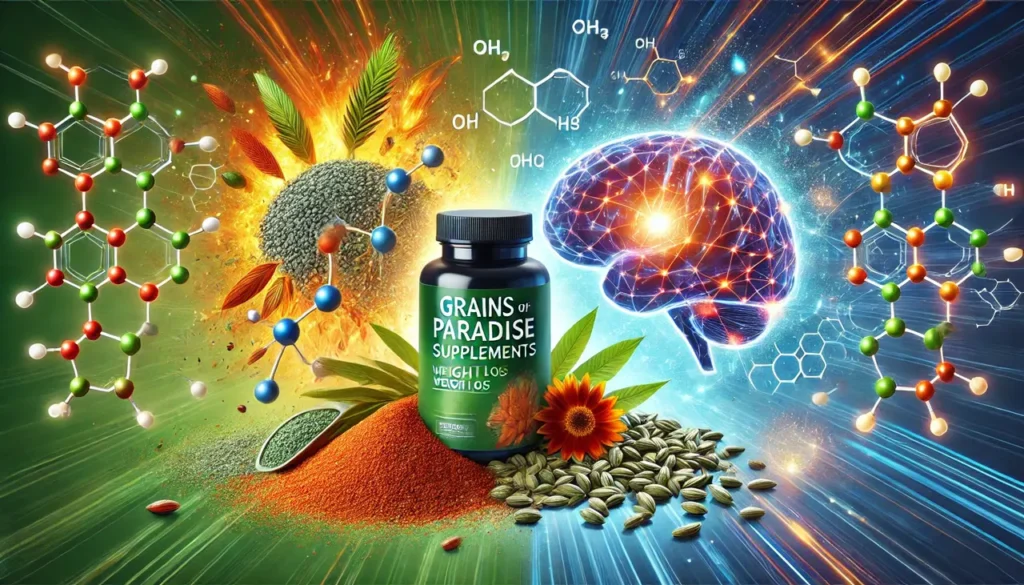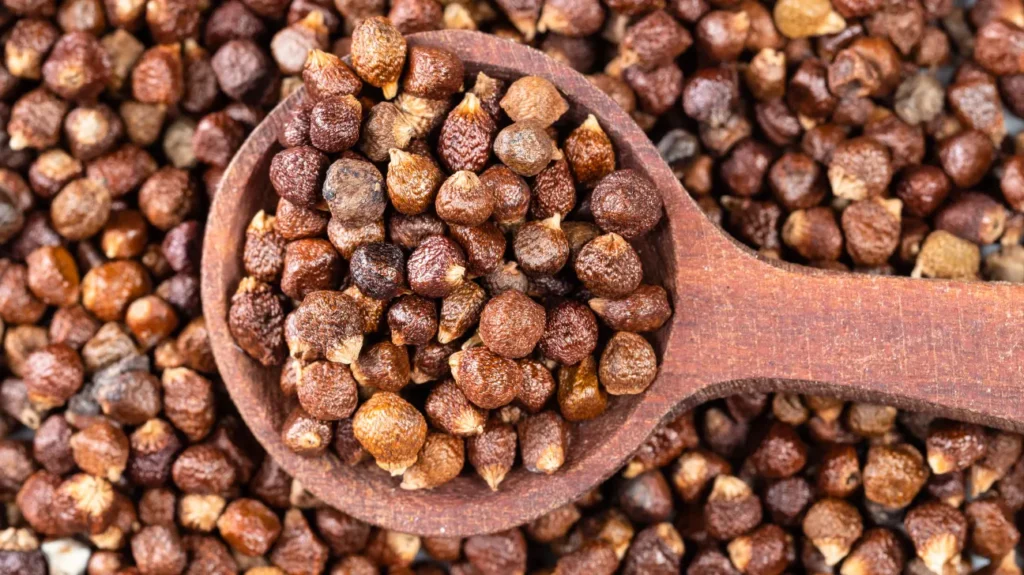Grains of Paradise, scientifically known as Aframomum melegueta, is a spice derived from the seeds of a plant belonging to the ginger family, Zingiberaceae. Traditionally used in culinary applications and as a traditional medicine, Grains of Paradise has garnered interest in the nootropic community for its potential cognitive-enhancing properties. This article explores the chemistry, physiological mechanisms, potential nootropic benefits, dosage guidelines, side effects, interactions with other supplements and medications, and important safety considerations regarding Grains of Paradise as a supplement.
You May Also Like:
Sources of Grains of Paradise
Grains of Paradise is primarily found in the tropical regions of West Africa, where it has been cultivated for centuries. The seeds are small, reddish-brown, and aromatic, imparting a unique flavor reminiscent of black pepper with hints of cardamom and citrus. Key sources and uses of Grains of Paradise include:
- Culinary Uses: Commonly used in West African cuisine, these seeds are often ground into a spice and added to dishes for their peppery flavor. They are also used in brewing certain types of beer and in the production of herbal teas.
- Traditional Medicine: In various cultures, Grains of Paradise has been employed for its purported health benefits, including digestive support, anti-inflammatory effects, and as an aphrodisiac.
- Supplement Form: Grains of Paradise extracts are available as dietary supplements, often in powder or capsule form, marketed for weight loss, cognitive enhancement, and metabolic support.
While many individuals can benefit from the dietary inclusion of Grains of Paradise, those looking for specific nootropic effects may consider supplementation.
Support Weight Management and Brain Health with Grains of Paradise Supplements—Buy Now on Amazon!

Chemistry of Grains of Paradise
The active compounds in Grains of Paradise are primarily identified as phenolic compounds, particularly 6-paradol, 6-gingerol, and other related gingerol derivatives. These compounds possess unique chemical structures contributing to their biological activities.
- 6-Paradol: This compound is particularly notable for its potential thermogenic effects, which may enhance energy expenditure and fat oxidation. It has been shown to activate specific receptors involved in metabolic regulation.
- Gingerol Derivatives: These compounds exhibit antioxidant and anti-inflammatory properties, contributing to the neuroprotective effects associated with Grains of Paradise. They interact with cellular signaling pathways to modulate inflammation and protect against oxidative stress.
The pharmacological effects of these compounds are believed to stem from their ability to influence various physiological mechanisms, making Grains of Paradise a compelling candidate for cognitive enhancement.

Physiological Mechanisms of Grains of Paradise in the Body and Brain
Grains of Paradise exhibits several physiological mechanisms that may contribute to its potential nootropic effects. The key mechanisms include:
- Increased Thermogenesis: The activation of brown adipose tissue (BAT) by compounds like 6-paradol may promote thermogenesis, which increases energy expenditure. This process can enhance overall metabolic rate and potentially support cognitive function by providing the brain with more energy substrates.
- Antioxidant and Anti-Inflammatory Effects: The phenolic compounds in Grains of Paradise can help mitigate oxidative stress and inflammation, which are known contributors to cognitive decline and neurodegenerative diseases. By reducing oxidative damage, these compounds may protect neurons and promote cognitive health.
- Modulation of Neurotransmitter Levels: Grains of Paradise may influence the synthesis and release of key neurotransmitters, including dopamine and serotonin, which are essential for mood regulation and cognitive function. This modulation could lead to improved mental clarity and enhanced cognitive performance.
- Neuroprotective Properties: The antioxidant effects of Grains of Paradise may help protect the brain from damage caused by free radicals, reducing the risk of age-related cognitive decline. By preserving neuronal integrity, Grains of Paradise helps support overall brain health.
Through these mechanisms, Grains of Paradise may serve as a valuable nootropic supplement, promoting enhanced cognitive function and overall mental well-being.

Nootropic Benefits of Grains of Paradise
- Enhanced Cognitive Performance: Preliminary research suggests that Grains of Paradise may improve cognitive performance by promoting energy metabolism and enhancing focus. The thermogenic properties of the spice may lead to increased blood flow and oxygen delivery to the brain, supporting cognitive processes. Enhanced blood circulation is crucial for optimal brain function, as it provides essential nutrients and oxygen necessary for neurotransmitter synthesis and overall neuronal health. Consequently, individuals may experience improved memory recall, learning abilities, and problem-solving skills, particularly during mentally demanding tasks.
- Mood Enhancement: Grains of Paradise may positively influence mood by balancing neurotransmitter levels and reducing inflammation. This effect could lead to improved emotional regulation and cognitive clarity, particularly in individuals experiencing stress or anxiety. By modulating the levels of serotonin and dopamine, key neurotransmitters associated with mood stability, Grains of Paradise could help mitigate symptoms of depression and anxiety. Furthermore, its anti-inflammatory properties may reduce neuroinflammation, which is often linked to mood disorders and cognitive decline, thereby promoting overall mental well-being.
- Support for Metabolic Health: By promoting thermogenesis and enhancing metabolic rate, Grains of Paradise may indirectly support cognitive function. Improved metabolic health is associated with better brain function, making this spice a beneficial addition to a cognitive-enhancing regimen. A well-functioning metabolism ensures that the brain receives a consistent supply of glucose, its primary energy source, which is essential for sustaining cognitive processes. Moreover, by aiding in blood sugar regulation, Grains of Paradise could help prevent spikes and crashes in energy levels, further supporting stable mental clarity and focus.
- Weight Management: Grains of Paradise has been studied for its potential role in weight management, particularly through its thermogenic effects. By aiding in fat metabolism and energy expenditure, it may support overall cognitive function, as a healthy body weight is often linked to better mental performance. The spice may stimulate the production of heat in the body, leading to increased calorie burning and fat oxidation. Additionally, maintaining a healthy weight is critical for preventing obesity-related cognitive impairments, emphasizing the connection between physical health and cognitive vitality.
- Neuroprotection: Emerging research indicates that Grains of Paradise may offer neuroprotective benefits, helping to safeguard brain cells from oxidative stress and neurodegeneration. The active compounds in the spice, particularly 6-paradol, exhibit antioxidant properties that combat free radicals and reduce oxidative damage to neurons. This protective effect is crucial for preserving cognitive function over time, potentially reducing the risk of age-related cognitive decline and neurodegenerative diseases such as Alzheimer’s. Furthermore, by supporting cellular integrity and function, Grains of Paradise may help enhance overall brain resilience, making it a promising candidate for long-term cognitive health.
- Increased Alertness and Focus: The stimulatory effects of Grains of Paradise could lead to heightened alertness and improved focus. By enhancing catecholamine levels, the spice may promote wakefulness and sharpen cognitive acuity. This increase in alertness can be particularly beneficial during tasks requiring sustained attention, helping individuals to maintain concentration and productivity over extended periods. Additionally, the energizing effects of Grains of Paradise could serve as a natural alternative to conventional stimulants, offering a more balanced boost without the jitters associated with caffeine.

Dosage and Supplementation Guidelines
For those interested in using Grains of Paradise as a nootropic supplement, understanding appropriate dosages is essential. While research is still emerging, general guidelines suggest the following:
- General Nootropic Dosage: Common dosages of Grains of Paradise range from 100 to 200 mg per day. This amount is often effective for cognitive enhancement and may be adjusted based on individual needs and responses.
- Supplement Forms: Grains of Paradise is available in various forms, including capsules, powders, and extracts. For those preferring a more concentrated form, standardized extracts containing 6-paradol may be beneficial.
- Combination with Other Nootropics: Grains of Paradise can be safely combined with other nootropic supplements, such as caffeine or L-theanine, to enhance cognitive effects. However, it is advisable to start with lower doses of each supplement to assess individual tolerance and response.
It is essential to consult with a healthcare professional before starting any supplementation regimen, particularly if other medications or health conditions are involved.
Elevate Your Wellness and Mental Focus with Grains of Paradise Supplements—Shop Now on Amazon!

Side Effects and Safety
Grains of Paradise is generally considered safe when used as directed. However, some individuals may experience mild side effects, especially at higher doses. Potential side effects include:
- Gastrointestinal Distress: Some users may experience nausea, diarrhea, or abdominal discomfort when consuming higher doses of Grains of Paradise.
- Allergic Reactions: Although rare, allergic reactions to Grains of Paradise may occur in sensitive individuals. Symptoms can include rashes, itching, or swelling.
- Interference with Blood Sugar Levels: Grains of Paradise has the potential to lower blood sugar levels. Individuals with diabetes or those taking medications for blood sugar control should monitor their levels closely when using this supplement.
Interactions with Other Supplements and Medications
Understanding potential interactions is crucial for safe supplementation with Grains of Paradise. Some known interactions include:
- Blood Sugar Medications: Grains of Paradise may enhance the effects of blood sugar-lowering medications, potentially leading to hypoglycemia. Individuals taking such medications should consult their healthcare provider before incorporating this supplement.
- Anticoagulants and Antiplatelet Medications: Grains of Paradise may affect blood clotting, so caution is advised for individuals taking anticoagulant or antiplatelet medications. Monitoring is recommended to avoid excessive bleeding.
- Nootropics: Grains of Paradise can be safely combined with other nootropic supplements. However, it is advisable to monitor individual responses, especially when using stimulants or other compounds that affect neurotransmitter levels.
Risks for Individuals with Certain Health Conditions
While Grains of Paradise is safe for most individuals, specific health conditions may necessitate caution. Key considerations include:
- Diabetes: Individuals with diabetes should use Grains of Paradise carefully due to its blood sugar-lowering effects. Regular monitoring of blood glucose levels is crucial to prevent hypoglycemia.
- Bleeding Disorders: Those with bleeding disorders or individuals scheduled for surgery should avoid Grains of Paradise due to its potential effects on blood clotting.
- Pregnancy and Lactation: Limited research is available regarding the safety of Grains of Paradise during pregnancy and lactation. Pregnant or breastfeeding individuals should consult a healthcare professional before using this supplement.
Promote Energy, Fat Loss, and Cognitive Clarity with Grains of Paradise—Order Today on Amazon!

Conclusion: Should You Consider Grains of Paradise as a Nootropic?
Grains of Paradise presents a promising option for individuals seeking cognitive enhancement and metabolic support. Its unique compounds may offer potential benefits for cognitive performance, mood regulation, and overall brain health. However, while preliminary research is encouraging, more studies are needed to fully elucidate its effects and safety profile as a nootropic supplement.
As with any supplement, it is vital to consult with a healthcare provider before starting supplementation, especially for individuals with pre-existing health conditions or those taking medications that may interact with Grains of Paradise. By ensuring safe and informed use, individuals can explore the potential benefits of this spice as part of a holistic approach to cognitive health and well-being.
In summary, Grains of Paradise may serve as a valuable addition to the growing landscape of nootropic supplements, supporting not only cognitive function but also overall metabolic health. By integrating this spice into a balanced diet and supplementation regimen, individuals may optimize their brain health and cognitive performance.

References:
- Anti-inflammatory Activity of Grains of Paradise (Aframomum melegueta Schum) Extract . Retrieved from: https://pmc.ncbi.nlm.nih.gov/articles/PMC4212708/
- Grains of Paradise. Retrieved from: https://www.rxlist.com/supplements/grains_of_paradise.htm
- Daily ingestion of grains of paradise (Aframomum melegueta) extract increases whole-body energy expenditure and decreases visceral fat in humans. Retrieved from: https://pubmed.ncbi.nlm.nih.gov/24759256/
Important Note: The information contained in this article is for general informational purposes only, and should not be construed as health or medical advice, nor is it intended to diagnose, prevent, treat, or cure any disease or health condition. Before embarking on any diet, fitness regimen, or program of nutritional supplementation, it is advisable to consult your healthcare professional in order to determine its safety and probable efficacy in terms of your individual state of health.
Regarding Nutritional Supplements Or Other Non-Prescription Health Products: If any nutritional supplements or other non-prescription health products are mentioned in the foregoing article, any claims or statements made about them have not been evaluated by the U.S. Food and Drug Administration, and such nutritional supplements or other health products are not intended to diagnose, treat, cure, or prevent any disease.


